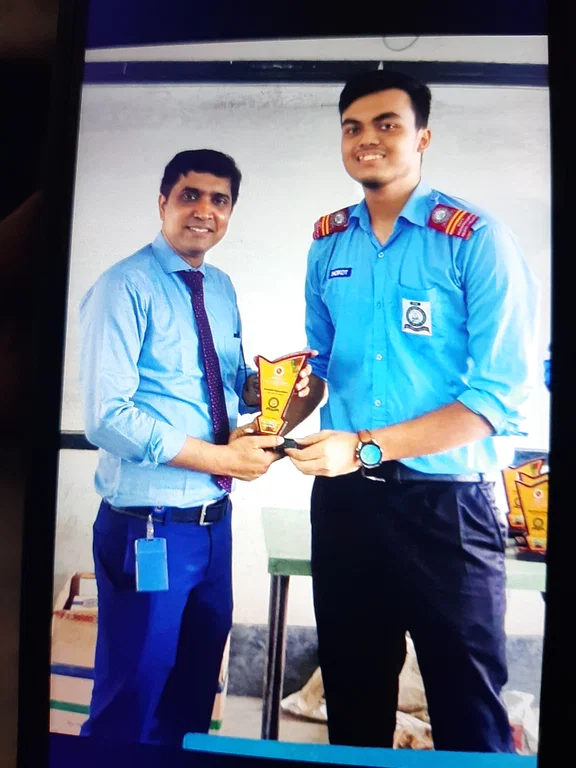Mansura Hossain
“Someone answered my son’s phone and said, your son is dead. After that, how I crossed the turbulent sea from Sandwip and reached Dhaka, even I can’t explain. I don’t seek justice for my son’s murder from anyone; I will only seek justice from Allah….”
Mahbubur Rahman spoke these words, the father of Mahamudur Rahman (Saikat). On July 19, amidst the quota reform movement, Mahamudur Rahman was killed by police gunfire at Noorjahan Road in Mohammadpur, Dhaka.
Last Friday, at their Noorjahan Road home, Mahbubur Rahman pointed to their pet cat Putu and said, “This is an animal, but since my son’s death, even this cat has almost stopped eating. It just sits quietly on my son’s chair.” Mahamudur Rahman had bought food for the cat before he died.
Dhaka was in turmoil on July 19. Mahbubur Rahman was at their village home in Sandwip, Chittagong. He kept calling his son for updates. His son once informed him he was at their shop, “General Store,” near their house. Then an unknown person answered and broke the news of his son’s death. Mahbubur Rahman never got his son’s phone back. Family members found Mahamudur’s bloodied body with a bandaged head at the morgue of Shaheed Suhrawardy Medical College Hospital. The cause of death was listed as “gunshot.” Mahamudur, 6 feet 2 inches tall, was preparing for university admission after passing HSC from Government Mohammadpur Model School and College.
Mahbubur Rahman continued, reminiscing about his son, whom he never called by name but as “Abbu.” He couldn’t recall ever scolding or being angry with him. Recalling July 19, he said, “I suddenly felt chest pain around noon that Friday. I didn’t understand why then. Now I realize that as a father, I must have felt the pain because my son was dying.”
Mahamudur would have turned 20 on September 11. His father recalled how his son bought him a shirt with his tutoring earnings for Eid, saying, “From today, my Eid has started.”
Mahamudur Rahman’s mother, Afroza Rahman, initially couldn’t speak clearly through her tears. Her husband, Mahbubur Rahman, tried to console her but broke down himself. For Eid, Mahamudur had bought fabric for his mother’s dress and paid extra for tailoring, but the dress was never made.
Afroza Rahman recounted that her son ate lunch after returning from Friday prayers on July 19 and then went to their shop. He briefly came home to inform his mother that his friend had been shot in the leg, then left again. Afroza was praying and didn’t talk to her son. “I never imagined such a disaster would occur that day. If I had known, I would have kept him inside,” she lamented.
Mahamudur Rahman was the only brother of Shahrina and Sabrina Afroze, who affectionately called him Tuna. After his death, Sabrina posted childhood pictures of him on Facebook, expressing their immense loss and pain. She described how he was shot and how his body was taken to the hospital.
Mahamudur had joined a gym and often showed off his muscles to his sisters, challenging them to arm-wrestling matches. Now, that vibrant brother is gone. Sabrina questioned why the police shot to kill instead of aiming for his limbs, which might have spared his life.
Sitting beside, Mahbubur Rahman added, “If my son wasn’t so tall, maybe the bullet wouldn’t have hit him.”
Mahbubur Rahman, a diploma engineer, had worked in Saudi Arabia and returned home seven to eight years ago. Struggling to make ends meet from their shop’s earnings, he had hoped his son would gradually take over the family’s responsibilities.
Expressing their anger about the current situation, Mahamudur’s family stated they didn’t want to face any harassment. Thus, they didn’t conduct an autopsy or file a case after his death.
Sixty-four-year-old Mahbubur Rahman’s only wish now is for his son’s grave at Mohammadpur cemetery to be permanent. His daughter, Shahrina, lives with her in-laws in Mohammadpur, while Sabrina searches for her brother’s memories at home, keeping his bloodstained clothes in a bag.
A poster from the organization Shoishob Mela Bangladesh, placed in front of their house, mourns Mahamudur Rahman’s death and seeks prayers for him. Mahabubur Rahman shared how he often unconsciously searches for his son while watching other boys play cricket in the alley where Mahamudur used to play. When he realizes his son is gone, he can’t hold back his tears.










